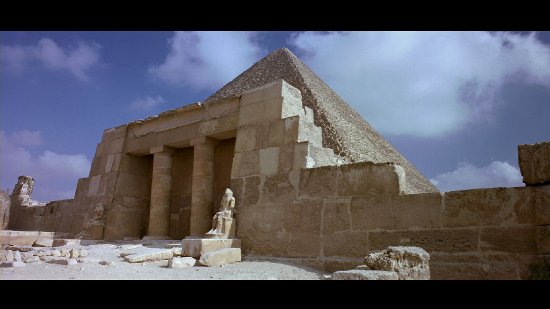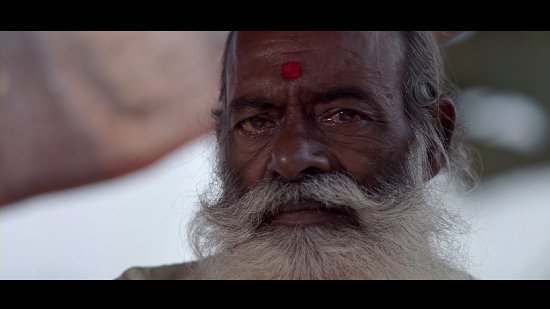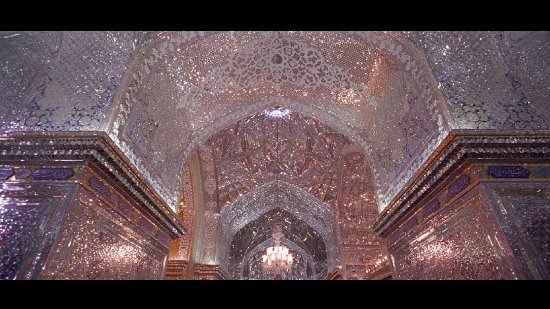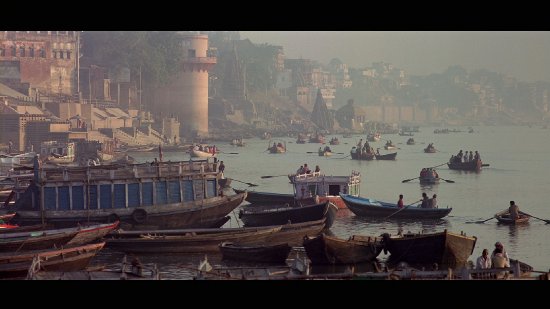Baraka
Ron Fricke was a writer, cinematographer and editor on the Francis Ford Coppola produced 1982 film Koyaanisqatsi and continued to work with time lapse and non-narrative documentary filmmaking with Chronos in 1985. His next big project used the same techniques and patterns to show how interlinked the world is despite its huge differences. After using an IMAX camera, finding it hard to use and that IMAX films are restricted to about 30-40 minutes, he and his friends built their own 70mm camera which they would take around the world. With this camera and hundreds of other items, Fricke and his team set off to make Baraka, a much bigger project than Chronos.
Shooting in 24 countries and over 100 locations, Baraka contains no dialogue, using the juxtaposition of images and a mix of diegetic and non-diegetic sounds to show the beauty of the natural world, man's propensity for destruction and the similarities that exist in our differences. Footage of a tattooed aborigine immediately follows an intricately decorated Yakuza in a Tokyo bathhouse, a tobacco factory in Java precedes footage of people hard at work in a computer plant in Japan and shots of Auschwitz blends into equally shocking images of the museums and a torture cell in Cambodia.
The film is bookended with footage of the sort of material that makes up the BBC's Planet Earth series but the middle section, beginning with the roar of a chain saw and a huge tree being felled, switches to the urban environment, showing the beauty (or otherwise) of such things as New York's Park Avenue and the Shibuya crossing in Tokyo. The footage of the Kuwait oilfields burning is as amazing as it is sad and the opening shots of the Himalayas are awe inspiring.
In what is believed to be a first, the original was painstakingly scanned at 8K resolution rather than the usual 2K and then restored frame-by-frame, removing any grain and scratches that were picked up at the time or in the period spent in storage since 1992. The result is the finest film to Blu-ray Disc picture that I have ever seen, rivalling those shot entirely on digital. The footage is amazing and needs to be seen to be believed - it took me a while, probably half an hour, to realise that my mouth was open in awe. The editing is stunning and makes a coherent message out of the series of seemingly disparate images. Unusually, the time lapse photography is not all shot using a fixed camera and there are pans, tilts and dollys within these incredible sequences.
As I said, they make use of both diegetic and non-diegetic sounds, with the music from Dead Will Dance, Inkuyo and Brother together with the score by Michael Stearns blend together, perfectly fitting the images to create an involving and moving audio visual experience. It helps that the sound is presented in a stunning digitally restored and remixed DTS-HD Master Audio (there is also a Dolby Digital 5.1 option which is fine).
The disc contains a seven minute feature on the restoration process in which the procedure is explained and a 67 minute retrospective containing contributions from all of the people who worked on the film and some behind the scenes footage. It's incredible how they shipped so much equipment around the world, storing it in their tiny Tokyo hotel rooms, had to bribe officials and play around with the wording on shipping manifests - some countries banned walkie talkies so they were using "field communication devices". Both of these are presented in 1080i.
Baraka is a film that you can watch and marvel at its sheer AV quality or you can engage your brain and see it on two levels: an incredible visual journey around the world, showing how little has changed and that our perception of cultured may need altering. I don't know about Ron Fricke, but I didn't feel as if the film was trying to preach or come across with a particular political message, as some documentaries do, as it's a film from which you can take what you want and I found it a profoundly moving and spectacular one.
Amazingly it hasn't dated, and at no point did I feel as if I was watching something over 16 years old - it's just as fresh as the most recent BBC nature series. Baraka is an incredible film and is presented on a superlative disc - the sort of thing that you could use to show off your system - and I can only wonder how good it would look shown in entirety on an IMAX screen.




Your Opinions and Comments
Be the first to post a comment!